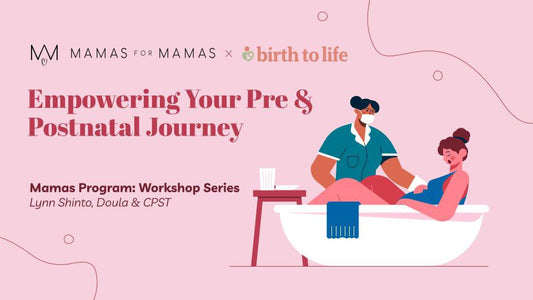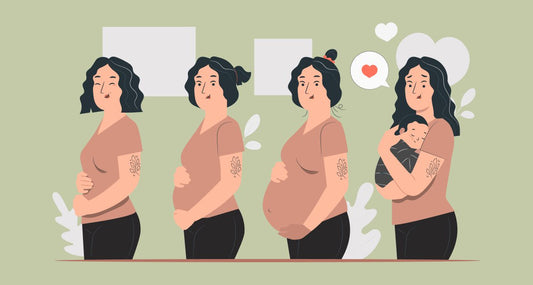Pregnancy and Mental Health: Nurturing Your Mind During This Transformative Time
Pregnancy is often portrayed as a joyous and magical experience, filled with excitement as you anticipate the arrival of your little one. However, this beautiful journey also brings a whirlwind of emotions and mental health challenges. It's crucial to understand the connection between pregnancy and mental health and recognize that you are not alone in this experience. Let’s delve into how to navigate this time with care and compassion.

Understanding Pregnancy and Mental Health
Expecting a baby is a significant life change, marked by various physical, emotional, and hormonal shifts. It's perfectly normal to experience a range of feelings during this time, from elation to anxiety. Research suggests that approximately 1 in 5 women experience some form of mental health challenge during pregnancy. This can range from mild anxiety to more severe conditions like depression.
You might be wondering, “Why am I feeling this way?” The answer lies in the emotional rollercoaster that pregnancy often entails. Hormonal fluctuations can impact your mood, and then there are the added stresses of preparing for a new baby. Understanding that these feelings are common can be reassuring. Remember, acknowledging your emotions is the first step toward nurturing your mental well-being.

Common Mental Health Challenges During Pregnancy
Among the various mental health challenges that may arise during pregnancy, anxiety and depression are the most prevalent.
Anxiety can manifest in many ways, including constant worrying about the health of your baby, fears about labor and delivery, or concerns about your ability to be a good parent. It's not uncommon to feel overwhelmed by these thoughts. Hormonal changes, lifestyle adjustments, and the pressure of impending parenthood can all contribute to heightened anxiety levels.
Depression during pregnancy, also known as antenatal depression, can present with symptoms such as persistent sadness, loss of interest in activities you once enjoyed, or feelings of hopelessness. Many expectant parents experience what is known as pregnancy-related anxiety, which can overshadow the joyful anticipation that should accompany this life stage.
Recognizing the symptoms is vital. If you find yourself feeling more anxious or depressed than usual, reaching out for help is essential. Mental health isn't just about avoiding negative states; it's about fostering a sense of well-being and joy during this transformative time.

The Importance of Support Systems
During pregnancy, having a strong support system is crucial for your mental well-being. Partners, family members, and friends play significant roles in providing emotional support and a listening ear. Don't hesitate to express your feelings and needs to those around you—communication is key.
As a doula, I believe in the value of emotional and practical support during this time. A doula can help create a calming environment, provide information, and assist you in navigating the emotional rollercoaster that may arise. By having someone by your side who understands your journey, you can feel more empowered and less isolated.
Having a robust support network can make a world of difference. Engaging with others who share similar experiences can be incredibly beneficial. Whether it’s joining a prenatal class or finding a local support group, connecting with other expectant parents can help ease emotional burdens and create a sense of community.

Self-Care Strategies for Mental Well-being
Taking care of your mental health during pregnancy involves intentional self-care practices. Here are some effective strategies to support your well-being:
-
Mindfulness and Relaxation: Incorporating mindfulness techniques such as meditation or deep breathing exercises can help ground you and calm racing thoughts. These practices can create a sense of peace amid the chaos of preparing for your baby’s arrival.Example Exercise: Find a quiet space, close your eyes, and take deep breaths in and out, focusing on the sensation of your breath. Allow any anxious thoughts to pass without judgment, gently guiding your mind back to your breath.
-
Physical Activity: Engaging in regular physical activity—like walking, swimming, or prenatal yoga—can boost your mood and relieve stress. Movement helps release endorphins, those wonderful chemicals that enhance your emotional state.Routine Suggestion: Aim for at least 30 minutes of light exercise most days of the week. Activities like walking or gentle stretching can be both invigorating and relaxing.
-
Healthy Eating: Nutrition plays a crucial role in mental health. Nourishing your body with healthy foods can positively impact how you feel. Consider incorporating omega-3 fatty acids, fruits, and vegetables into your diet for overall wellness.Meal Idea: A bowl of oatmeal topped with fresh berries and a drizzle of honey can be a comforting and nutritious start to your day, supporting both your body and mind.
-
Rest and Sleep: Prioritize rest whenever possible. Quality sleep is vital for mental health, and ensuring you get enough rest can help you recharge emotionally and physically.Sleep Tips: Establish a calming bedtime routine, like reading a book or taking a warm bath, to signal to your body that it's time to wind down.
- Creative Outlets: Engage in activities that inspire you, whether it’s journaling, painting, or crafting. Expressing yourself creatively can serve as an excellent outlet for your feelings.Creative Practice: Dedicate time each week to a hobby you enjoy. This could be as simple as sketching in a notebook or knitting a small project.

When to Seek Professional Help
While self-care is essential, there may come a time when additional help is necessary. It’s important to recognize when your feelings may require professional attention. If you notice persistent feelings of sadness, overwhelming anxiety, or if everyday tasks feel unmanageable, consulting a mental health professional can make a significant difference.
Here's a helpful guideline: If your emotional state is affecting your ability to function daily, it might be time to reach out. Mental health resources, such as therapists or counselors specializing in prenatal care, can provide the support you need. Don’t hesitate to seek assistance—caring for your mental health is just as important as taking care of your physical health.
How Doula Services Can Help
As a doula, my role extends well beyond physical support during labor and delivery. I’m here to provide emotional and educational support throughout your pregnancy journey. Let me outline the ways in which my services can make a difference:
- Emotional Support: I offer a compassionate presence, listening to your concerns, validating your feelings, and helping you process your emotions. Knowing that you have a trusted confidant can significantly alleviate stress.
- Educational Resources: I can provide you with vital information about mental health during pregnancy, helping you understand what you’re experiencing and offering strategies to manage these feelings. Knowledge is power, and being informed can foster a sense of control and stability.
- Practical Assistance: From helping you create a birth plan to preparing for postpartum recovery, my goal is to reduce your stress and support your well-being. Practical help can ease the burden of responsibilities, allowing you to focus on your mental and emotional health.
- Postpartum Support: After delivery, I continue to offer support through various services such as belly binding, bodywork massage, and recovery meals. This ongoing care ensures that you feel nurtured and cared for even after your baby arrives.
- Pregnancy Belly Cream: I also suggest using pregnancy belly cream regularly to prevent stretch marks. Many mothers find comfort in this self-care routine, as it’s a nurturing way to connect with their changing bodies.
Having a doula by your side can transform your pregnancy experience, providing a sense of security and calm during this transformative time.
For more information on the services I offer, feel free to visit my about page, read through our FAQs, or contact me.

FAQs
- What is the relationship between pregnancy and mental health? Pregnancy brings significant physical and emotional changes, which can impact mental health. Many expectant parents experience anxiety or depression due to hormonal shifts, lifestyle changes, and worries about parenthood.
- How can I identify if I’m experiencing prenatal depression or anxiety? Symptoms may include persistent sadness, overwhelming fear, mood swings, or a loss of interest in activities. If these feelings interfere with daily life, it might be time to seek help.
- What support can a doula provide for my mental health during pregnancy? A doula offers emotional support, educational resources, and practical assistance, helping you feel supported and prepared throughout your pregnancy journey. The continuous presence and understanding that a doula brings can be incredibly comforting.
- Are there specific therapies recommended for pregnant individuals struggling with their mental health? Yes, engaging in therapy with a mental health professional who specializes in prenatal care can be beneficial. Techniques such as cognitive behavioral therapy (CBT) may offer helpful strategies for managing anxiety and depression.
- What self-care practices can I implement to support my mental well-being during pregnancy? Focus on mindfulness, nutrition, physical activity, rest, and creative outlets to nurture both your body and mind. These self-care practices can play a significant role in maintaining mental wellness during pregnancy.







0 comments